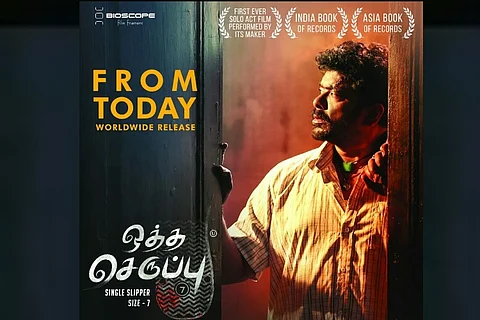

Parthiban’s Oththa Seruppu Size 7 is an interesting film because at the end of it, you observe a lot about the way you watch a film, how short your attention span is, and what keeps you hooked. In that sense, the actor/director is as much a part of the experiment as we are.
In its very first scene, the film makes you feel like you’ve opened a book, as you piece together the images and dialogues you see and hear on screen. There’s only Masilamani (Parthiban) in the frame, and we’ll see only him for the next two hours. But slowly, we begin to pay attention to the voices of those who are not shown on screen, to help us navigate the film. And how much can you deduce about a person with just voices? The short-tempered police officer is perhaps young? How would the senior officer who often gets calls from his wife look? How would Mahesh, Masi’s 7-year-old-son, look? Oththa Seruppu piques our curiosity successfully.
When we're used to overcrowded, over-colourful frames, with too much information being thrown at us from all directions, Oththa Serppu’s minimalist approach can be disconcerting. Like the eyes adjusting to sudden darkness, Oththa Seruppu guides us slowly through its world. For the first few minutes, Masi, the only character in the frame, does not speak (mouna viratham we’re told). Slowly, we grasp the minor details - the thick glasses on the table, the light from the open window, the stitches on Masi’s head… before Parthiban’s voice is first heard.
The camera’s gaze on Masilamani (also called Masi) shifts on and off from that of the audience to the other characters in the film. We never see them, but we see what's happening from their perspective, with the camera producing the desired effect. Someone brings in a newspaper and drops it on the table, another character looks at it while getting up from their chair, an officer who walks into the room swiftly looks up at the shattered portrait and we get to see how Masi has fixed it. Sometimes, we're unsure of the identity of the characters.
Another interesting layer to the film is that while we get to know about Masi’s life from his perspective, the outside world, the view just outside the station room window, is also from what Masi tells us.
And Masi is quite eloquent in his descriptions. “I won’t tell you why I did it but shall I tell you how?” he says, before acting out the crime he has committed. The “why” and “how” of the multiple murders are intertwined, presenting a tightly-knit puzzle.
Oththa Seruppu has a very simple story but a knotted narrative. Masi is brought in for questioning about a murder. While his son waits outside, the police finds out that Masi is more than just what meets the eye. Parthiban has done an extraordinary job in trying to hold our attention throughout the film’s run-time. The execution is more impressive than the story itself.
Slowly, one character after the other, Usha (Masi’s wife), Mahesh (his son), the psychologist who comes in on day-2, the DSP, the auto driver, take shape in our heads. Their brief dialogues give us more than what an actual performance might. Flashbacks are ingeniously conveyed with Masi half recollecting and half narrating those sequences.
If Masi is the film’s main character, the sounds play the second important role. The use of western classical music in one scene sounds out of place and the guiding background score gets in the way at some points. However, the sound effects - of necks being slowly slashed, of blood gushing out, of the distant waves of the seashore - have been perfectly captured to leave an impact.
If there are minor gripes, it is that the edakku-madakku speaking Parthiban is sometimes more himself than Masi. However, to assert that he's aware of this, he justifies his dry humour in one scene.
Also, with Masi being our main character, Usha’s perspective on their life together is entirely untold. We evidently see their life together from Masi’s perspective, and yet the film is too quick to play judge to their choices. Given that most of the characters too are men, the film entirely misses out on the woman’s side of the story. Was there a reason why she aspired to covet money, at the cost of lying to her husband? We don't know.
While its 2-hour runtime is tightly packed, the film might seem like a drag towards the end with one too many reveals. Masi seems to be overdosing on the twists - or is that Parthiban? - and we get a little impatient with the stretched out story. And it's not over when we think it is because we still have to find out about the 'oththa seruppu size 7'.
Disclaimer: This review was not paid for or commissioned by anyone associated with the series/film. TNM Editorial is independent of any business relationship the organisation may have with producers or any other members of its cast or crew.